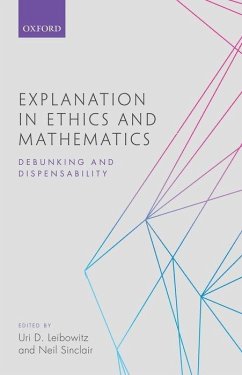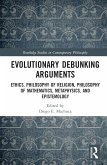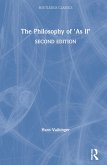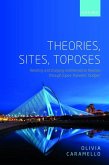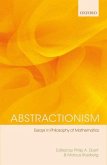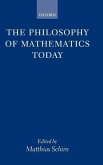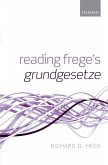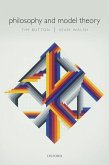Explanation in Ethics and Mathematics: Debunking and Dispensability
Herausgeber: Leibowitz, Uri D.; Sinclair, Neil
Explanation in Ethics and Mathematics: Debunking and Dispensability
Herausgeber: Leibowitz, Uri D.; Sinclair, Neil
- Gebundenes Buch
- Merkliste
- Auf die Merkliste
- Bewerten Bewerten
- Teilen
- Produkt teilen
- Produkterinnerung
- Produkterinnerung
How far should our realism extend, and how should we understand the entities referred to by mathematical and ethical talk? This volume explores how argumentative strategies in the philosophy of mathematics might apply to ethics, and vice versa. A team of experts breaks new ground in both areas and illuminates new questions, arguments, and problems.
Andere Kunden interessierten sich auch für
![Evolutionary Debunking Arguments Evolutionary Debunking Arguments]() Evolutionary Debunking Arguments195,99 €
Evolutionary Debunking Arguments195,99 €![The Philosophy of 'As If' The Philosophy of 'As If']() Hans VaihingerThe Philosophy of 'As If'178,99 €
Hans VaihingerThe Philosophy of 'As If'178,99 €![Theories, Sites, Toposes: Relating and Studying Mathematical Theories Through Topos-Theoretic 'Bridges' Theories, Sites, Toposes: Relating and Studying Mathematical Theories Through Topos-Theoretic 'Bridges']() Olivia CaramelloTheories, Sites, Toposes: Relating and Studying Mathematical Theories Through Topos-Theoretic 'Bridges'131,99 €
Olivia CaramelloTheories, Sites, Toposes: Relating and Studying Mathematical Theories Through Topos-Theoretic 'Bridges'131,99 €![Abstractionism: Essays in Philosophy of Mathematics Abstractionism: Essays in Philosophy of Mathematics]() Abstractionism: Essays in Philosophy of Mathematics114,99 €
Abstractionism: Essays in Philosophy of Mathematics114,99 €![The Philosophy of Mathematics Today The Philosophy of Mathematics Today]() Matthias Schirn (ed.)The Philosophy of Mathematics Today119,99 €
Matthias Schirn (ed.)The Philosophy of Mathematics Today119,99 €![Reading Frege's Grundgesetze Reading Frege's Grundgesetze]() Richard G Heck JrReading Frege's Grundgesetze119,99 €
Richard G Heck JrReading Frege's Grundgesetze119,99 €![Philosophy and Model Theory Philosophy and Model Theory]() Tim ButtonPhilosophy and Model Theory142,99 €
Tim ButtonPhilosophy and Model Theory142,99 €-
-
-
How far should our realism extend, and how should we understand the entities referred to by mathematical and ethical talk? This volume explores how argumentative strategies in the philosophy of mathematics might apply to ethics, and vice versa. A team of experts breaks new ground in both areas and illuminates new questions, arguments, and problems.
Produktdetails
- Produktdetails
- Verlag: Oxford University Press, USA
- Seitenzahl: 256
- Erscheinungstermin: 16. August 2016
- Englisch
- Abmessung: 236mm x 152mm x 23mm
- Gewicht: 476g
- ISBN-13: 9780198778592
- ISBN-10: 0198778597
- Artikelnr.: 47869009
- Verlag: Oxford University Press, USA
- Seitenzahl: 256
- Erscheinungstermin: 16. August 2016
- Englisch
- Abmessung: 236mm x 152mm x 23mm
- Gewicht: 476g
- ISBN-13: 9780198778592
- ISBN-10: 0198778597
- Artikelnr.: 47869009
Uri D. Leibowitz studied Physics and Philosophy at Tel-Aviv University in Israel. He earned his PhD from the University of Massachusetts, Amherst. Before joining Nottingham's Department of Philosophy he had taught at the University of Colorado at Boulder and Cornell College. He has published papers in Noûs, Philosophical Studies, The Journal of Moral Philosophy,and Ethical Theory and Moral Practice. His work covers issues in metaethics and normative ethics, the philosophy of science, and ancient philosophy. He has been awarded an AHRC-funded research project on explanation in ethics. Neil Sinclair studied philosophy at both Cambridge and Oxford before joining the Philosophy Department at the University of Nottingham. His principal research area is metaethics. He has published papers in Philosophical Studies, The Philosophical Quarterly, Analysis, and Biology and Philosophy. His work covers issues such as the nature of truth, belief and moral mental content, the evolutionary origins of moral judgement, the logic of moral arguments, moral mind-independence, and the nature of moral explanations. He has been awarded two AHRC-funded research projects: one on moral mental content, and one on explanation in ethics. In 2014 he received a University of Nottingham Lord Dearing Award for outstanding contribution to the development of teaching and learning.
* 1: Neil Sinclair and Uri Leibowitz: Introduction: Explanation in
Ethics and Mathematics
* Part I: Evolutionary Debunking Arguments
* 2: Justin Clarke-Doane: Debunking and Dispensability
* 3: Folke Tersman: Explaining the Reliability of Moral Beliefs
* 4: Toby Handfield: Genealogical Explanations of Chance and Morals
* 5: Erik J. Wielenberg: Evolutionary Debunking Arguments in Religion
and Morality
* 6: Hallvard Lillehammer: 'An Assumption of Extreme Significance':
Moore, Ross and Spencer on Ethics and Evolution
* 7: Richard Joyce: Reply: Confessions of a Modest Debunker
* Part II: Indispensability Arguments
* 8: Alexander Miller: Moral Explanation for Moral Anti-Realism
* 9: David Liggins: Grounding, Explanation, and Multiple Realization in
Mathematics and Ethics
* 10: Debbie Roberts: Explanatory Indispensability Arguments in
Metaethics and Philosophy of Mathematics
* 11: Mary Leng: Taking Morality Mathematically: Enoch's
Indispensability Argument
* 12: Alan Baker: Non-Optional Projects: Mathematical and Ethical
* 13: David Enoch: Indispensability Arguments in Metaethics: Even
Better than in Mathematics?
Ethics and Mathematics
* Part I: Evolutionary Debunking Arguments
* 2: Justin Clarke-Doane: Debunking and Dispensability
* 3: Folke Tersman: Explaining the Reliability of Moral Beliefs
* 4: Toby Handfield: Genealogical Explanations of Chance and Morals
* 5: Erik J. Wielenberg: Evolutionary Debunking Arguments in Religion
and Morality
* 6: Hallvard Lillehammer: 'An Assumption of Extreme Significance':
Moore, Ross and Spencer on Ethics and Evolution
* 7: Richard Joyce: Reply: Confessions of a Modest Debunker
* Part II: Indispensability Arguments
* 8: Alexander Miller: Moral Explanation for Moral Anti-Realism
* 9: David Liggins: Grounding, Explanation, and Multiple Realization in
Mathematics and Ethics
* 10: Debbie Roberts: Explanatory Indispensability Arguments in
Metaethics and Philosophy of Mathematics
* 11: Mary Leng: Taking Morality Mathematically: Enoch's
Indispensability Argument
* 12: Alan Baker: Non-Optional Projects: Mathematical and Ethical
* 13: David Enoch: Indispensability Arguments in Metaethics: Even
Better than in Mathematics?
* 1: Neil Sinclair and Uri Leibowitz: Introduction: Explanation in
Ethics and Mathematics
* Part I: Evolutionary Debunking Arguments
* 2: Justin Clarke-Doane: Debunking and Dispensability
* 3: Folke Tersman: Explaining the Reliability of Moral Beliefs
* 4: Toby Handfield: Genealogical Explanations of Chance and Morals
* 5: Erik J. Wielenberg: Evolutionary Debunking Arguments in Religion
and Morality
* 6: Hallvard Lillehammer: 'An Assumption of Extreme Significance':
Moore, Ross and Spencer on Ethics and Evolution
* 7: Richard Joyce: Reply: Confessions of a Modest Debunker
* Part II: Indispensability Arguments
* 8: Alexander Miller: Moral Explanation for Moral Anti-Realism
* 9: David Liggins: Grounding, Explanation, and Multiple Realization in
Mathematics and Ethics
* 10: Debbie Roberts: Explanatory Indispensability Arguments in
Metaethics and Philosophy of Mathematics
* 11: Mary Leng: Taking Morality Mathematically: Enoch's
Indispensability Argument
* 12: Alan Baker: Non-Optional Projects: Mathematical and Ethical
* 13: David Enoch: Indispensability Arguments in Metaethics: Even
Better than in Mathematics?
Ethics and Mathematics
* Part I: Evolutionary Debunking Arguments
* 2: Justin Clarke-Doane: Debunking and Dispensability
* 3: Folke Tersman: Explaining the Reliability of Moral Beliefs
* 4: Toby Handfield: Genealogical Explanations of Chance and Morals
* 5: Erik J. Wielenberg: Evolutionary Debunking Arguments in Religion
and Morality
* 6: Hallvard Lillehammer: 'An Assumption of Extreme Significance':
Moore, Ross and Spencer on Ethics and Evolution
* 7: Richard Joyce: Reply: Confessions of a Modest Debunker
* Part II: Indispensability Arguments
* 8: Alexander Miller: Moral Explanation for Moral Anti-Realism
* 9: David Liggins: Grounding, Explanation, and Multiple Realization in
Mathematics and Ethics
* 10: Debbie Roberts: Explanatory Indispensability Arguments in
Metaethics and Philosophy of Mathematics
* 11: Mary Leng: Taking Morality Mathematically: Enoch's
Indispensability Argument
* 12: Alan Baker: Non-Optional Projects: Mathematical and Ethical
* 13: David Enoch: Indispensability Arguments in Metaethics: Even
Better than in Mathematics?
